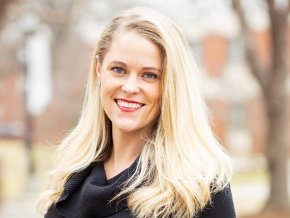
Looking through a student-centered lens
Hubbard named assistant vice president for the Office of Mission, Engagement and Innovation
In October 2022, Lenoir-Rhyne named Leah Beth Hubbard the new assistant vice president for the Office of Mission, Engagement and Innovation (MEI), where she will manage the many ways the university engages with potential and current students as well as the larger community.

At its heart, the mission of Lenoir-Rhyne helps prepare our students for purposeful lives and service through exceptional experiences. However, meeting the goal set in those simple words requires complex strategies and processes, which is where MEI plays a critical role.
“Mission, engagement and innovation is really student-centered,” Hubbard shared. “While we focus on the university’s mission, we’re looking through the lens of new and current students so we can partner with them in a way that is engaging, innovative and transformative.”
Hubbard previously held leadership positions at Appalachian State University and Queens University of Charlotte before joining LR in 2018 as the special assistant to the president for strategic initiatives – where she worked to address issues that impact the institution across the complex university landscape. In early 2022, she was named director of undergraduate admission and held that position until her promotion in October.
As assistant vice president for MEI, Hubbard will continue working closely with the president’s office as well as representing the university’s interests in government affairs and community outreach. She also assumes oversight of both undergraduate and graduate admission as the office of admission restructures to combine all university admissions processes under a single entity.
“In centralizing the admissions process, we understand that while populations and needs may be different, the process remains similar for all potential students,” said Hubbard.
Because undergraduate and graduate application procedures use the same system and online interfaces, combining the two sides of admission will streamline those technical processes. The result will be a tighter focus on engaging with prospective students on a personal level, connecting them with the academic offerings and extracurricular options that are most relevant to their interests and goals.
Hubbard remarked, “As each generation of students makes their needs clear, we see that our responses must be innovative in how we connect and work with students at all levels. We’re also connecting with all the constituents connected to those students — parents, guardians, family members, high school counselors, principals, teachers, anyone and everyone — to best serve them through the admission process and after they enroll at LR.”
The long-term goal for engagement through university admissions involves appealing to a more diverse pool of prospective undergraduate and graduate students who will benefit from LR’s offerings and expanding the university’s profile beyond a local or regional scope.
“LR remains grounded in a rich and deep history of serving the local population and the Lutheran population, and we’re committed to those populations,” Hubbard explained. “We also realize that students from all over want the option of a smaller, less urban setting.”
While larger institutions have larger resources, those resources aren’t necessarily accessible to all students, especially undergraduates.
“The setting at LR allows for hands-on learning, engagement and research opportunities, and our students are rooted in a sense of vocation and purpose. They come here and want to be doers, understanding that our doors are open.”

Named Charlotte Mecklenburg and North Carolina School Counselor of the Year, Mena uses her background in mental health and education to strengthen student success and family engagement.
View More
Owens teaches creative writing at Lenoir-Rhyne and has mentored hundreds of student writers. Now he brings that same commitment to his new role as Hickory’s first poet laureate.
View More